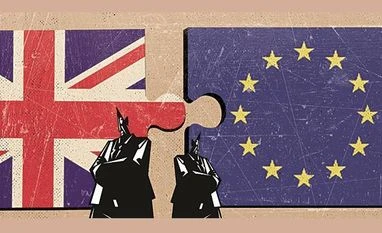O’Reilly blames Britain for stirring up those grievances. Its expected departure — possibly a messy one — from the European Union, known as Brexit, is reopening old wounds and resentments in Ireland against its former colonial master.
“The British,” said O’Reilly, a retired pub manager, as he wove back and forth across the barely detectable border in his car, “are about to kick us in the teeth again.”
In the tortured history between the two island nations, Brexit is just the latest in a long line of perceived slights the Irish have suffered at the hands of the British. And now, with the possible exception of Britain, no country stands to lose more from Brexit, and particularly from a damaging “no-deal” departure, than Ireland.
Not only would that be economically destructive, analysts say; if it results in the return of a hard international border, it could even undermine the hard-won 1998 peace deal with Northern Ireland, known as the Good Friday Agreement.
While the ultimate impact of Brexit is still a matter of debate, there is no question that the issue is stoking tensions between the countries. Barbed comments directed toward Ireland by British supporters of Brexit over the so-called “backstop,” a kind of insurance policy against a hard border being discussed in withdrawal negotiations, have inflamed Irish sentiment.
“The general discourse in parts of the UK is extremely arrogant and quite condescending, the feeling that ‘these people don’t know their place,’” said Tony Connelly, European editor of RTE News and the author of Ireland and Brexit.
“That, in turn, has awakened a kind of ancient defiance on the Irish side as well,” he said. “All these historical nerve endings that were buried by the Anglo-Irish peace process have reawakened a bit.”
The Good Friday agreement ended 30-odd years of fighting in Northern Ireland, which is part of the United Kingdom, between predominantly Catholic communities that favoured joining the Republic of Ireland and largely Protestant loyalists of the British crown, backed by British troops.
During the so-called Troubles, at least 3,500 were killed and relations between Dublin and London were deeply strained.
© 2019 The New York Times News Service
To read the full story, Subscribe Now at just Rs 249 a month
Already a subscriber? Log in
Subscribe To BS Premium
₹249
Renews automatically
₹1699₹1999
Opt for auto renewal and save Rs. 300 Renews automatically
₹1999
What you get on BS Premium?
-
Unlock 30+ premium stories daily hand-picked by our editors, across devices on browser and app.
-
Pick your 5 favourite companies, get a daily email with all news updates on them.
Full access to our intuitive epaper - clip, save, share articles from any device; newspaper archives from 2006.
Preferential invites to Business Standard events.
Curated newsletters on markets, personal finance, policy & politics, start-ups, technology, and more.
Need More Information - write to us at assist@bsmail.in
)